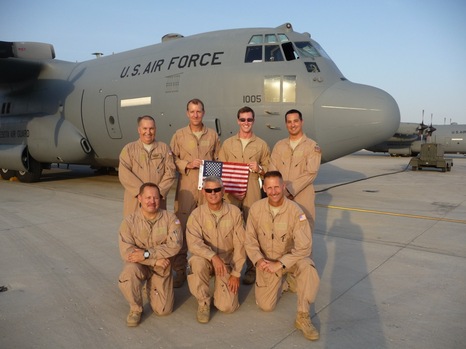
Jennifer: Welcome back from Qatar, sir. Tell us about the airdrops you did in Iraq, to help the Christians persecuted by ISIS.
Hero Husband Guy: The planners in the Air Force gave us coordinates to fly over and release the bundles. I think there were 14 bundles of water and food. We know it was on top of Sinjar mountain. What is this article you're writing again? Is this going on Facebook?
Jen: Yes honey, all my blogs go on Facebook now. And the airdrops were at night?
Hubs: Right. We had two C-130s and we flew over some point, and at the designated place in the air is when we release the stuff out of the back of the airplane. We fly in from a high altitude, drop down to about 2000 feet above the ground and then slow down to the drop air speed, open the back door. The navigator calls “green light” and a cable cuts a strap. Since we're at a steep angle, the 14 bundles of water and food roll out the back. It probably takes about 16 seconds for it to roll out the back. When it’s all out, the load master says “load clear” and we know we can maneuver to clear the drop area. Then we close the back door and accelerate back up to 18,000 feet back to our base.
Jen: How fast are y'all flying when you drop the supplies?
Hubs: We slow down to 120 miles an hour when we do the airdrop. We’re flying about 300 miles an hour at high altitude. An airline jet goes 500 miles an hour.
Jen: So you were wearing nightvision goggles?
Hubs: Yeah, we were. All I saw were a few truck lights and things like that, I didn't see any people. Of course they wanted to make sure we didn’t drop the bundles on top of anybody. That would seriously injure or kill someone. So the drop zone was clear of people that time of night.
Jen: I know you train for this sort of thing all the time. What was different about this mission?
Hubs: It was the middle of night to an area we were unfamiliar with. The anticlimactic thing is we didn't ever interact with the people on the ground, we didn't ever talk to them. We were talking to people on the radio. We weren’t sure what kind of stuff ISIS was going to throw up at us. Air missiles, or if they even cared what we were doing. ISIS could have gotten what we dropped for all I know.
Jen: Everyone really appreciates your service to our nation, babe.
Hubs: I don't think they're doing any more air drops now, but plenty of husbands are still over there.
Hero Husband Guy: The planners in the Air Force gave us coordinates to fly over and release the bundles. I think there were 14 bundles of water and food. We know it was on top of Sinjar mountain. What is this article you're writing again? Is this going on Facebook?
Jen: Yes honey, all my blogs go on Facebook now. And the airdrops were at night?
Hubs: Right. We had two C-130s and we flew over some point, and at the designated place in the air is when we release the stuff out of the back of the airplane. We fly in from a high altitude, drop down to about 2000 feet above the ground and then slow down to the drop air speed, open the back door. The navigator calls “green light” and a cable cuts a strap. Since we're at a steep angle, the 14 bundles of water and food roll out the back. It probably takes about 16 seconds for it to roll out the back. When it’s all out, the load master says “load clear” and we know we can maneuver to clear the drop area. Then we close the back door and accelerate back up to 18,000 feet back to our base.
Jen: How fast are y'all flying when you drop the supplies?
Hubs: We slow down to 120 miles an hour when we do the airdrop. We’re flying about 300 miles an hour at high altitude. An airline jet goes 500 miles an hour.
Jen: So you were wearing nightvision goggles?
Hubs: Yeah, we were. All I saw were a few truck lights and things like that, I didn't see any people. Of course they wanted to make sure we didn’t drop the bundles on top of anybody. That would seriously injure or kill someone. So the drop zone was clear of people that time of night.
Jen: I know you train for this sort of thing all the time. What was different about this mission?
Hubs: It was the middle of night to an area we were unfamiliar with. The anticlimactic thing is we didn't ever interact with the people on the ground, we didn't ever talk to them. We were talking to people on the radio. We weren’t sure what kind of stuff ISIS was going to throw up at us. Air missiles, or if they even cared what we were doing. ISIS could have gotten what we dropped for all I know.
Jen: Everyone really appreciates your service to our nation, babe.
Hubs: I don't think they're doing any more air drops now, but plenty of husbands are still over there.
 RSS Feed
RSS Feed